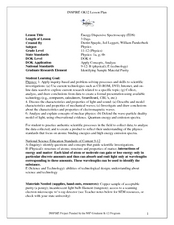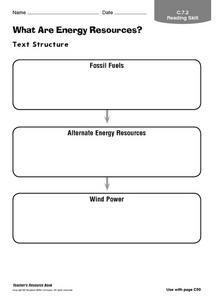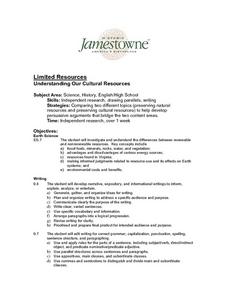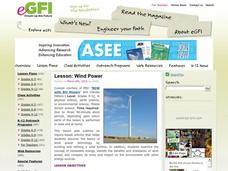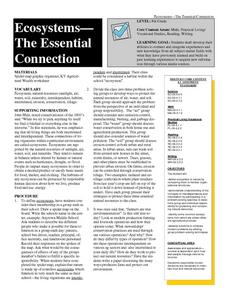Curated OER
How Does Energy Change Form?
In this energy worksheet, students compare and contrast how potential energy and kinetic energy change form. This worksheet is a graphic organizer.
Curated OER
Home Energy Audit: Electrical Production Worksheet
In this energy production worksheet, students describe the difference between renewable and nonrenewable energy and identify the different types of energy. This worksheet has 1 short answer, 1 matching, and 1 problem to solve.
Curated OER
Energy Dispersive Spectroscopy
Students calculate the values of electron binding energies. In this physics lesson plan, students solve for different wavelength characteristics of X-rays. They present their findings to the class.
Curated OER
What Are Energy Resources?
In this energy resources worksheet, students will describe the different types of energy resources including fossil fuels, wind power, and alternate energy resources. This worksheet is a graphic organizer.
Curated OER
Forces And Energy
Pupils investigate the atom and how it is formed. They conduct research using a variety of resources and then construct a model of the atom. Then students have class discussion. The lesson includes background information for the teacher...
Curated OER
How Does Thermal Energy Spread?
In this thermal energy worksheet, students will brainstorm a main idea on how thermal energy is spread and then they will write in three details that support their main idea.
Curated OER
How Do Living Things Get Energy?
In this living things worksheet, students complete a graphic organizer by writing in 1 main idea and 2 supporting details about how living things get energy.
Curated OER
Limited Resources - Understanding Our Cultural Resources
Pupils examine and compare preserving natural resources and preserving cultural resources. They conduct Internet research on two topics, and write a position paper on whether cultural resources or natural resources are more important to...
Curated OER
Wind Power
Students explore wind energy. In this wind power lesson, students create models of wind turbines and experiment with changes that will help efficiency. Students watch a video on wind power and discuss. Students work in groups to create...
National Academy of Sciences
Lights at Night Webquest
Help learners find ways to become more efficient energy consumers. To start, individuals research how different countries address energy efficiency and then analyze their own carbon footprint. They use their research to identify ways to...
Curated OER
Ecosystems-The Essential Connection
Students develop their abilities to solve problems both in school and in a variety of situations similar to that they have encountered in life. They define the term ecosystem in nature by comparing them to familiar organizational...
Illustrative Mathematics
Telling a Story With Graphs
Turn your algebra learners into meteorologists. High schoolers are given three graphs that contain information about the weather in Santa Rosa, California during the month of February, 2012. Graph one shows temperatures, graph two...
Virginia Department of Education
Chemical Bonds
How are chemical bonds similar and how are they different? Provide your young chemists with the resources to more thoroughly understand the concepts of ionic and covalent bonds. Pupils research these topics, diagram examples of each...
Teach Engineering
Life Cycles
Breathe some life into product design. Pupils learn about the stages of product creation, use, and disposal—sometimes called a cradle-to-grave assessment. They see how this cycle relates to the life cycle of organisms.
Curated OER
Chocolate Chip Cookie Mining
To understand the impact coal mining has on the environment, pupils will extract chocolate chips from a cookie. Imagine the cookie is the environment and the chips are the coal. Instruct them to mine as many chips as they can, then have...
Science Friday
Wind Power
Blow away the competition with a lesson about wind power and turbines. Groups build windmills to test how the size of blades affect the amount of work done. The scholars build a variety of blades and collect data on how each type...
T. Trimpe
Atomic Basics
Get down to basics with these worksheets on the structure of atoms. Challenging young chemists to identify information from the periodic table and create Bohr diagrams and Lewis dot structures for different elements, this...
Magic of Physics
Franklin's Lab
Get energized! Circuitry scholars follow the path of energy from its beginnings as a fossil fuel all the way to bulbs and batteries using an interesting interactive. Groups or individuals help Ben Franklin discover how to convert and...
CK-12 Foundation
CK-12 Earth Science Concepts for Middle School
Explore a variety of science concepts in an interactive textbook created for middle school scholars. A lengthy table of contents takes readers to pages comprised of a subject overview, outline, and summary. Follow links further to find...
Teach Engineering
Powering a Device Using Food
Eat up a resource on using food to power electrical devices. Future engineers first experiment with different fruits and vegetables to determine the amount of electrical energy they provide. Based on the data, they design and create an...
Curated OER
Cartoons in the Classroom: Conserve or Drill
To drill or to conserve? This question is the foundation of the political cartoons up for critical analysis in this well-composed instructional activity. Learners will analyze two cartoons guided by background information and excellent...
NOAA
Ocean Primary Production
A cold seep is an area on the ocean floor where hydrocarbons leak from the earth, creating entire unique biomes. Learners explore cold seeps, photosynthesis in the ocean, and its limitations due to loss of sunlight. They further explore...
Energy for Keeps
Going for a Spin: Making a Model Steam Turbine
Discover the effectiveness of wind, water, and steam as energy sources. The hands-on activity has young scientists create a turbine from common materials. After constructing the turbines, they use wind, water, and steam to turn them and...
Colorado State University
How Can You Demonstrate the Different Efficiencies of Different Light Bulbs?
Need a bright idea for an engaging lab? Watch your class light up as they explore the difference in efficiency between incandescent and LED bulbs! The resource makes use of simple materials and encourages learners to infer what's...




